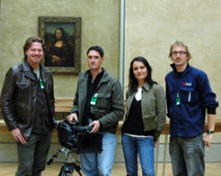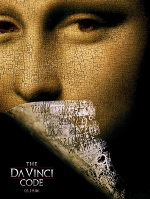Seventh-day Adventist scholars, pastors and church members are readying a variety of responses to The Da Vinci Code, the blockbuster motion picture that has captured an enormous share of media attention.
The movie version of author Dan Brown's 40-million-copy bestseller, with Tom Hanks in a leading role, is due to open in theatres worldwide on May 19.
While the central themes of the book--that Jesus married Mary of Magdala, had children and that His physical bloodline continued in France-- are fictitious, the ideas raised by the book have prompted a worldwide discussion, one which Adventists need to be aware of and capitalize on as a witnessing opportunity, one evangelist says.
"The Da Vinci Code is a suspense-filled, spine tingling read that blends fiction with fiction," says Mark A. Finley, a general vice president of the Adventist world church and head of the Center for Global Evangelism. "Although author Dan Brown claims it is 'historical fiction,' there is very little solid history in it."
However, he adds, "the novel and movie provide Christians everywhere an opportunity to show the contrast between the eternal Word of God and the living Christ and the superficiality of an imaginary story."
Finley notes that one of the book's more exotic claims-- that a secret "Priory of Sion," or Zion, was founded 900 years ago and that parchments housed at the Bibliothèque Nationale in Paris reveal that its membership included many leading figures of literature, art and science, has been heartily disproved by two secular media outlets: CBS News' 60 Minutes and the BBC.
"Brown claims Constantine formulated the New Testament canon with the church in the fourth century," Finley adds. "The overwhelming historical evidence is that the New Testament writings were considered as authoritative by believers as early as the second century."
Finley also notes a claim by novelist Dan Brown that "the church voted on the divinity of Christ at the Council of Nicea in 325 A.D., and that it was a close vote. The truth is, it was a vote of 360 to 2, [so] it was hardly close at all."
"The essence of Brown's argument is you can't have confidence in the Bible, and Jesus is merely a good man," Finley says. "For Christians, however, the Bible is divinely inspired and Jesus is the Son of God."
While the book presents an evangelistic opportunity for Adventists and other Christians asked about the truth of the Code's claims, there also a soupçon--to borrow a French cooking term--of postmodernism in the book, declares Dr. Jon Paulien, New Testament department chairman at the Seventh-day Adventist Theological Seminary at Andrews University in Berrien Springs, Michigan.
"Brown is probably a skilled polemicist, [and] he's put together a case in fiction form," Paulien tells Adventist News Network in a telephone interview. "The overall thing is that for the younger generation today, science, religion and the Bible have been discredited as reliable sources of truth. ... That leaves the younger generation searching for bits of truth here and there, so they will fall for whatever interests them."
Paulien says such disaffection leaves people open to suggestion, however exaggerated those claims may seem to those grounded in Scripture. He said Da Vinci may well appeal to those who were similarly attracted to this historical fiction of Oliver Stone's JFK, a 1991 drama which gave credence to a discredited theory that the assassination of American President John F. Kennedy in 1963 was the result of a conspiracy.
"I think people are looking for some sort of center in life," Paulien notes. Many "are trying to find a place to put their life together. There's a strong sense of life being broken, and almost hopeless, certainly depressing. ... Anybody that comes along with a confident story will attract some."
In Australia, Adventists are readying a series of television programs on DVD, and a book, to counter the movie's claims.
According to Pastor Grenville Kent, co-author of the The Da Vinci Decode book, his motivation for writing the book was an overheard conversation. "One day on the street I heard one [city employee] say to another, 'Are you still a Christian? Haven't you read The Da Vinci Code?' That motivated me.
"I know of young Adventists who've stopped coming to church after reading it," he comments. "A girl from my church had a university friend tell her to read The Da Vinci Code and she'd 'get over her silly Christian faith.' And [co-author Dr. Philip Rodionoff] has taken seminars on this, and had Christians ask worriedly whether the book's claims are true."
Pastor Geoff Youlden, presenter ofThe Code video series, concurs: "The Da Vinci Code may be a work of fiction but it potentially changed the way millions of people perceive the Bible and Jesus Christ. It has also brought religious discussion back into everyday conversation and people are interested in knowing the truth about the characters they have read about."
Both resources focus on the central claims of Dan Brown's novel: the divinity and history of Jesus, the origins of the Bible and the status of women in Christian belief.

The Code production crew, with presenters Leah McLeod and Geoff Youlden, visited key sites from The Da Vinci Code story.
"We also visited the locations of the Gnostic gospels in Egypt, and the Dead Sea Scrolls in Israel," says Adventist Media's series producer Behren Schulz. "And we interviewed historians, archaeologists, professors, scientists and Bible scholars.
"The series mixes documentary with drama," he explains. "Woven into each of the five episodes is the story of a young woman on a quest to discover the truth about her own mysterious origins, demonstrating humanity's insatiable desire 'to know.'"
"It's not time to hide our heads in our hymnbooks and ignore it," explains Kent. "It's time to do a 1 Peter 3:15--to 'give a reason for the faith' that is in us, 'with gentleness and respect.' I feel good that God is turning a potential attack on Christianity into a chance to retell the story of Jesus for a new generation.
"We don't slam the novel," he says. "We use it as an opportunity to affirm the positives of Jesus: that He was real, witnessed by independent historians, predicted (with superhuman accuracy) by prophecy, and that His teachings (in the original form) are amazing."
Kent says working with the material of his book has been faith affirming for him personally. "Looking closely again at the story of Jesus, I was impressed by how tight and logical the evidence is, and inspired and humbled and encouraged by what an attractive personality He is," he reflects. "I felt like a jeweler who gets to work with diamonds."
The actual impact of Brown's novel on people's spiritual lives is difficult to assess. One group that did, American research firm The Barna Group in Ventura, Califonia, noted that some 45 million Americans claim to have read the book: Among the adults who have read the entire book, one out of every four (24 percent) said the book was either "extremely," "very," or "somewhat" helpful in relation to their "personal spiritual growth or understanding." That translates to about 11 million adults who consider The Da Vinci Code to have been a helpful spiritual document.
To place that figure in context, the Barna study revealed that another recently published popular novel about Jesus Christ--Christ the Lord: Out of Egypt, written by Anne Rice--was deemed to be spiritually helpful by 72 percent of its readers--three times the proportion who lauded Dan Brown's book, the group said in a statement. [Editors: Mark A. Kellner and Nathan G. Brown for ANN/APD; Nathan Brown, South Pacific Adventist Record editor-in-chief, reported on that region's response to the novel and film.]

